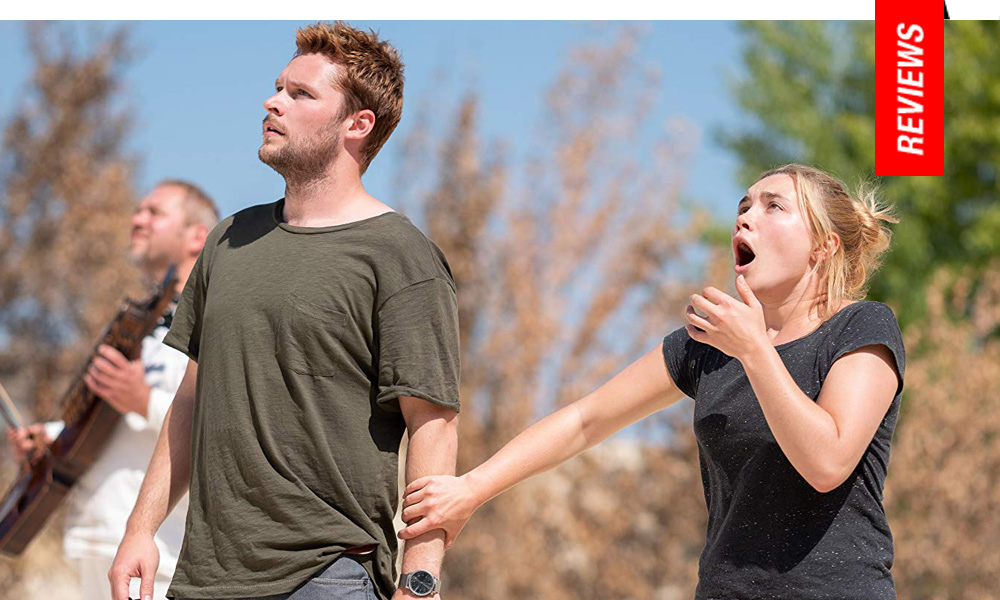Secret Ceremony: Aster Gets Cruel for the Summer with Wicked Rituals
Reeling from the aftershocks of a devastating familial tragedy, Dani (Pugh) must immediately put her grief on hold as she attempts to repair her flailing relationship with her long-term boyfriend Christian (Jack Reynor), who is suffering through his own slump of arrested development. Jack’s classmate Pelle (Vilhelm Blomgren), has orchestrated a trip home to Sweden, where he was raised in an extremely isolated commune on the verge of commencing a Midsommar tradition which takes place only once every ninety years. Christian invites Dani along on the trip rather than confronting her with his real feelings about their relationship, exacerbating the group’s masculine dynamic, which includes the outspoken Mark (Will Poulter) and Josh (William Jackson Harper), eager to explore Pelle’s obscure community for his thesis.
We already know Dani’s future is doomed within minutes of Midsommar’s opening, wherein the worst is confirmed as concerned the fate of her nuclear family. Distracted and distressed by her crumbling four-year relationship with Reynor’s aptly named Christian, she’s adrift in the world without a veritable emotional support network shackled to a life raft swiftly sinking. Accepting the invitation to tag along to her boyfriend’s covertly planned trip to Sweden, himself more of a parasitic freeloader intent on bastardizing the ideas of his peers to steer his own lack of educational direction, is clearly a horrifically ill-conceived idea. And yet, it brings her into contact with the only human capable of empathy and solace in Vilhelm Blomgren’s Pelle, who seems suspiciously enthusiastic about her joining the trip. This particular dynamic of the failed relationship as the platform for Dani and Christina’s dive into a Scandinavian heart of darkness follows the beats of Edward Dein’s 1960 B-movie melodrama The Leech Woman, in which an alcoholic Coleen Gray, whose scientist husband no longer desires her, insists on accompanying him on an African expedition where he will observe an anti-aging ritual by an obscure tribe—cruelty and a devious reversal of fortune ensues.
Aster’s careful build, in which gas-lighting and purposeful gender-based miscommunication are the norm (Dani’s sole feminine consolation includes an opinionated phone conversation while Christian is irretrievably mired in his callous gang of self-serving male post-grads) sets an unsettling pallor, aided by edits from Lucian Johnston. An eerie stage is set and cinematographer Pawel Pogorzelski takes us out of the darkness of Hereditary and into the chilling radiance of the summer solstice midnight sun.
Whereas Robin Hardy’s iconic The Wicker Man (1973) was hidden until the climax, Aster leaves all his clues in plain sight, and, if anything, avoids genre clichés by stringing us along in a narrative which doesn’t diverge from its inevitable finale. However, along the way, it’s Midsommar’s well-attenuated detail which straddles the line of repulsion and fascination. Through the figure of William Jackson Harper’s Josh, the sole member of Pelle’s expedition who seems appropriately passionate about the experience, we learn chilling details of the commune’s ‘ways,’ including Aster’s continued fascination with disfigured humans who tend to hold significantly hallowed keys or are mysterious conduits for the culture’s traditions. Likewise, Shirley Jackson’s classic short story “The Lottery” seems an obvious reference point as well.
Ritual and tradition are a matter of cultural perspective after all, and the religious dictates which continue to define birth, marriage and death are strictly coded by Judeo-Christian societies. Obviously, the isolated commune in Midsommar is a pagan community, and a shocking The Ballad of Narayama styled dispatch of its elders is explained in a placating way for its anthropological observers. But, as Harper’s Josh proves, prying Western eyes have a tendency to do more than just observe, and Aster’s script carefully molds us along with Dani’s cypher, ‘acclimating’ us to these ancient traditions. Those familiar with Hereditary will see Aster’s obsessions with exploring the discomfort of the outsider vs. the normalization of human traditions in full force (or even the outré incest thread of his celebrated 2011 short “The Strange Thing About the Johnsons”). But even as it is bookended by decidedly horrific instances, there’s a devious tonal shift which takes place, riding on a cycle defined by cultural delineations of pre-determined death, either as a tragedy or merely a necessary pit stop in an endless life cycle.
★★★★/☆☆☆☆☆
